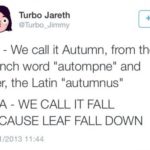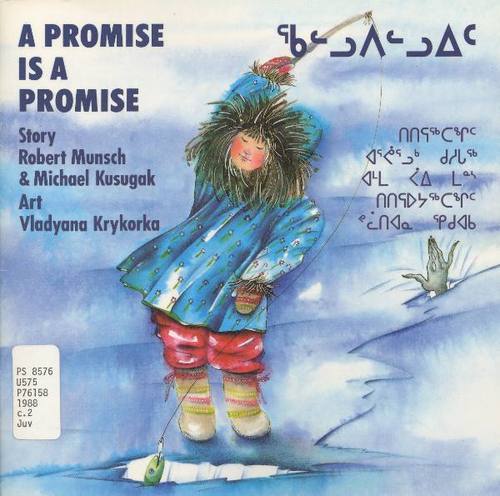i…
Fuck
Actually, ‘fall’ has its origins as an Anglo-Saxon word, and was popularized for use to denote the season around the 16th century from the poetic term ‘the fall of leaf.’ In the language that would develop after 1066, words that were coded as being common or lowly generally had Anglo-Saxon roots while the ‘educated’ words of the elite had French and Latin roots. This is why, even in modern English, we use ‘cow,’ which has an Anglo-Saxon origin, for the animal out in the field and ‘beef,’ which has a French origin, for the food to be consumed. The poor handle the animal while the rich eat the meat, and that is reflected in the language. The language of the conquerors was elevated while the language of the conquered was made base and common. If ‘autumn’ sounds smarter than ‘fall,’ that is only the linguistic snobbery of history talking.
LINGUISTIC BITCHSLAP.
Thank you. I was too lazy to find my post.
Fun related fact – the meaning of the word “November” in several Slavic languages (and “October” in Croatian because fuck you that’s why) – variations on listopad – is also named for falling leaves, list being “leaf” and pad being “fall”.
Tag: lingnerd
Time article: Slow Down! Why Some Languages Sound So Fast
I have questions about the “density” thing (additional link on density)… it seems like they’re saying it’s entirely about how long it takes someone to say something which. Japanese is losing that partly because it’s natural to be redundant in sentence construction, so you might be saying the equivalent of “now right now I did this thing just now” or something because it flows properly in conversation, but all the extra nows aren’t necessary to be understood. But anyway. It’s still an interesting study, and the end result is that I’d agree that Japanese sentences tend to be rather lengthy (in syllables) to say the same thing an English sentence would so.
The most important thing I learned, though, was that there is no such thing as “standard English” with a capital E. Instead there are many “englishes” with a lower case E. There is the english of the Caribbean and the english of the southern United States and the english of Oxbridge and the english rappers use in their music. Traditionally we’re taught that one of these is better than the rest, but in this class I learned that that’s an arbitrary distinction and not necessarily the case.
Why? Well, there are two schools of thought when it comes to how we should use language. One is “prescriptive” and it’s backed by grammar snobs and the kind of people who froth at the mouth over the decline of “the King’s English”. The other is “descriptive” and it’s more about accepting that how people use language is how language works. A prescriptivist believes in the idea of standard English and sees mistakes everywhere. A descriptivist sees many englishes, and none of them are standard.
[…] We’re all fluent in more than one english, for example the language of our peer group and the language of our parents’ generation. And then there are the two factors that have possibly the biggest impact on how we use language: education and socioeconomic status. When you judge people for what you consider to be poor grammar, you’re judging them for not being as good as you at something that might be a challenge because they didn’t have the advantages or experience you did. Maybe they haven’t had the luxury of worrying about their grammar. Maybe their use of language is right in line with their community. Maybe you’re just being a pedantic, prescriptivist jerk.
Alright. I just wanted to add one short story about a mythological beast from the Inuit. This happens to be one of my favorite pictures of all time, just because of the level of creepiness involved. These are Qallupilluit, Qallupilluk singular. Now, Qallupilluit are ocean creatures that steals lone children through cracks in the ice.
There are many descriptions for a Qallupilluit, so I’ll name a couple popular ones. They are claimed to be short with blue skin, they wear parkas made of loon feathers, and their hair is home to a host of sea critters like crabs, and laced with seaweed.
Sometimes they are described with long hair, like the picture, and green skin with long finger nails. They are said to wear a amauti, a unique parka created with a pouch for a child to rest in.
Sometimes they are said to have scaly and bumpy skin. And even sometimes they have an eider duck parka. Most descriptions of the creature include a pouch for carrying children.
They are said to reek of sulfur, which I’m sure adds to their non-existant appeal. Inuit elders say that Qallupilluit have a specific humming sound that they make, and you can hear it when they are near. They also tend to jump out of the cracks in the ice without warning. And, the most creepy thing to me, they knock on the ice and you can hear the distinct tapping. If the ocean gets particularly wavy or steam rises, a Qallupilluit is hiding in the water.
No one is sure why they steal children. Some speculate loneliness. Others speculate dinner. Some variations of Qallupilluit mythology say that the child stolen will either die or turn into a mermaid to live underwater with the Qallupilluk that took them.
Most accounts claim that this was a legend created to scare children away from playing on the beach alone, or approaching cracking, drifting ice. But, even so, I wanted to include this because something about the idea of Qallupilluit really scares the crap out of me. Humming, ice tapping, baby kidnapping ocean creatures.
The Inuit sure knew how to scare the crap out of children (and possibly everyone else. Unless I’m alone here.)
Oh hey, Robert Munsch wrote a kids book about these that my mom used to read to me when I was little.
I really loved that book as a kid, tbh 🙂
i am reminded that english is a flawed language every time I am forced to use “that that” in a sentence
it’s not fair that that happens
It makes it sound like the English language had gone out to dinner and had had too much to drink.
Get out
You think “that that” is bad?
oh my god



